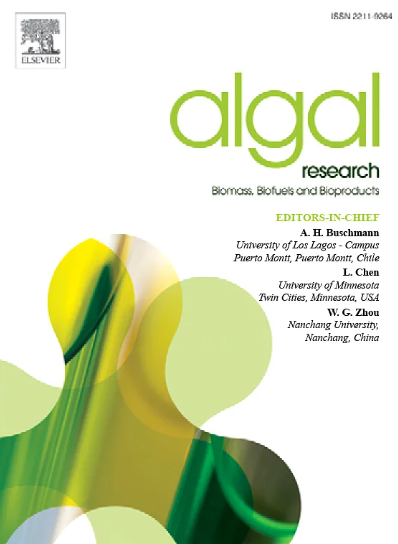提高传质能力的藻类培养系统的化学特性和方法整合
IF 4.5
2区 生物学
Q1 BIOTECHNOLOGY & APPLIED MICROBIOLOGY
Algal Research-Biomass Biofuels and Bioproducts
Pub Date : 2025-05-21
DOI:10.1016/j.algal.2025.104102
引用次数: 0
摘要
藻类培养系统为可持续生物燃料生产、废水修复和碳封存提供了有前途的途径;然而,它们的性能经常受到次优传质的限制。化学方法和综合优化技术对于提高藻类培养系统的传质是必不可少的。这些策略解决了数学模型和化学动力学在不同培养设计、藻类菌株、营养成分和环境条件下的内在变异性。这些应用的有效性依赖于最大限度地在藻类细胞与其周围介质之间交换关键物质,如二氧化碳(CO2)、氧气、营养物质和代谢副产物。这篇综述系统地研究了核心化学过程,包括养分吸收动力学、pH缓冲和二氧化碳固定。这些过程使用代表性的数学模型进行评估,如Michaelis-Menten动力学和Monod方程,这些模型反映了系统结构、物种特异性生理和环境条件引入的可变性。本文探讨了如何将化学处理与机械策略(包括曝气、混合和光分配)相结合,以提高传质性能。它强调,这些干预措施的有效性取决于经验推导的动力学参数量身定制的个别系统的要求。该评估讨论了分析藻类系统的挑战、限制和未来方向,强调了先进建模方法和跨学科合作的重要性。特别注意到传质系数和反应动力学的环境依赖性。这篇综述综合了当前的知识,通过定制的、系统特定的解决方案来支持可持续的、可扩展的藻类技术的发展。本文章由计算机程序翻译,如有差异,请以英文原文为准。
Chemical characterization and integration of approaches in algal cultivation systems for enhanced mass transfer
Algal cultivation systems offer promising pathways for sustainable biofuel production, wastewater remediation, and carbon sequestration; however, their performance is frequently constrained by suboptimal mass transfer. Chemical approaches and integrative optimization techniques are essential for enhancing mass transfer in algal cultivation systems. These strategies address the inherent variability in mathematical models and chemical kinetics across different cultivation designs, algal strains, nutrient compositions, and environmental conditions. The effectiveness of these applications relies on maximizing the exchange of key substances such as carbon dioxide (CO2), oxygen, nutrients, and metabolic byproducts between algal cells and their surrounding medium. This present review systematically examines core chemical processes, including nutrient uptake dynamics, pH buffering, and CO2 fixation. These processes are evaluated using representative mathematical models, such as Michaelis–Menten kinetics and the Monod equation, which reflect variability introduced by system architecture, species-specific physiology, and environmental conditions. The paper explores how the integration of chemical treatments with mechanical strategies, including aeration, mixing, and light distribution, can enhance mass transfer performance. It emphasizes that the effectiveness of these interventions depends on empirically derived kinetic parameters tailored to individual system requirements. The evaluation discusses the challenges, limitations, and future directions in analyzing algae systems, highlighting the importance of advanced modeling methods and interdisciplinary collaboration. Special attention is given to the context-dependent nature of mass transfer coefficients and reaction kinetics. This review synthesizes current knowledge to support the development of sustainable, scalable algal technologies through tailored, system-specific solutions.
求助全文
通过发布文献求助,成功后即可免费获取论文全文。
去求助
来源期刊

Algal Research-Biomass Biofuels and Bioproducts
BIOTECHNOLOGY & APPLIED MICROBIOLOGY-
CiteScore
9.40
自引率
7.80%
发文量
332
期刊介绍:
Algal Research is an international phycology journal covering all areas of emerging technologies in algae biology, biomass production, cultivation, harvesting, extraction, bioproducts, biorefinery, engineering, and econometrics. Algae is defined to include cyanobacteria, microalgae, and protists and symbionts of interest in biotechnology. The journal publishes original research and reviews for the following scope: algal biology, including but not exclusive to: phylogeny, biodiversity, molecular traits, metabolic regulation, and genetic engineering, algal cultivation, e.g. phototrophic systems, heterotrophic systems, and mixotrophic systems, algal harvesting and extraction systems, biotechnology to convert algal biomass and components into biofuels and bioproducts, e.g., nutraceuticals, pharmaceuticals, animal feed, plastics, etc. algal products and their economic assessment
 求助内容:
求助内容: 应助结果提醒方式:
应助结果提醒方式:


